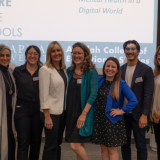Little Saigon Provides Big Lessons
December 13, 2013
Recently, a group of
Counseling and School Psychology
students went on a field trip of sorts. Students from the class of Phuong Le Nguyen, Ed.D , visited the
Nguio-Viet Daily Newspaper
and the
Orange County Asian Pacific Islander Community Alliance
to learn more about Asian cultural characteristics as protective and risk factors in mental health. The goal was to consider best practices in counseling for this population. The students had an opportunity to interview individuals, which allowed the students to learn interview techniques and questioning strategies. Before the trip, students mingled with locals at a local community restaurant and enjoyed the traditional Vietnamese beef noodle dish of “pho.” After the trip, it was back to class, where students worked collaboratively to develop an outline that organized the themes that emerged from the interview data. This was a wonderful way for the students to apply and build upon their knowledge of qualitative methods.
Rachel Chan, Student, School Counseling
Rachel Chan, one of the students, summarized her experience in the Interview Report. She made personal connections to this community and outlined a deep understanding of the implications the themes elucidated in the interviews. Here are a few excerpts from her assignment:
My classmates and I interviewed Mr. Do, a 74 year old writer from Nguoi Viet. Nguoi Viet is a Vietnamese newspaper company based in Westminster, California that brings local news to the surrounding Vietnamese community. .. Mr. Do was very willing to share his personal stories, experiences, and perspectives and responded with detailed descriptions. We were able to learn about his background history and journey emigrating from Vietnam to Canada and finally to California. He moved to Canada at the age of 36 and worked as a salesperson. With the encouragement of his wife, he enrolled in a MBA program and taught finance at a university. However, he had a lot of frustrations with his job and missed Vietnam. He moved to California and immersed himself into a Vietnamese community where he felt closer to home. He also shared personal anecdotes about his family and his beliefs on mental health and education.
Our second interview was at OCAPICA which is an organization that works with families in the Orange County area primarily of Asian or Pacific Islander ethnicity, but are open to providing services for anybody. We interviewed Ms. Talua and Ms. Ms. Tang who are young social workers in their 20s and work as a clinician and program coordinator respectively. … Ms. Talua and Ms. Tang shared how providing services and resources for Asian and Pacific Islander families were influenced by the family’s beliefs on mental health and cultural values. Ms. Talua and Ms. Tang also shared a little about their personal experiences and perspectives growing up in a Pacific Islander household and Chinese household and how that influenced their work.
Having grown up in a Chinese household myself, I saw a lot of similarities between my cultural values and those of Mr. Do and the families from OCAPICA. An important theme that was mentioned throughout the interviews was the concept of family. One of the biggest aspects in an Asian family was its support system. Mr. Do was originally unhappy in Canada and missed Vietnam very much, but with the support of his wife, he found direction and enrolled in a university. He believed there was nothing he could not overcome as long as he was with his family and described it as a strong institution where he felt safe. Having a strong support system in the family was a protective factor for him and allowed him to overcome his obstacles.
I grew up with the same values and a strong support system has always been the most important thing in my family. However, the concept of one family unit exists not only in Vietnamese and Chinese cultures, but in many Asian cultures as well. It is very common to stick together with your family members and consider oneself as a small part to the bigger unit of the family (Lee & Mock, 2005, p. 271 & 274). Likewise, Ms. Talua and Ms. Tang shared similar perspectives and values found in their clients. Family support may be due to an Asian principle of collectivism, but was evident in Pacific Islander families who also have a collective and holistic approach on life. The family and community’s needs are placed before individual needs and sometimes this can get in the way of the child’s academic success. They are pressured to provide for the family and place those needs first which can create a lot of stress and pressure.
Rachel moves on to relate a keen understanding between family and counseling. Clearly, this rich opportunity to move beyond the classroom and textbook proved very worthwhile!
Note:
Dr. Phuong Le Nguyen is a member of the Chapman adjunct faculty. He is also a school Psychologist for Long Beach Unified School District. He serves as the Vice Chair of the Board of Executives for the Consortium to Advance School Psychology in Vietnam.


